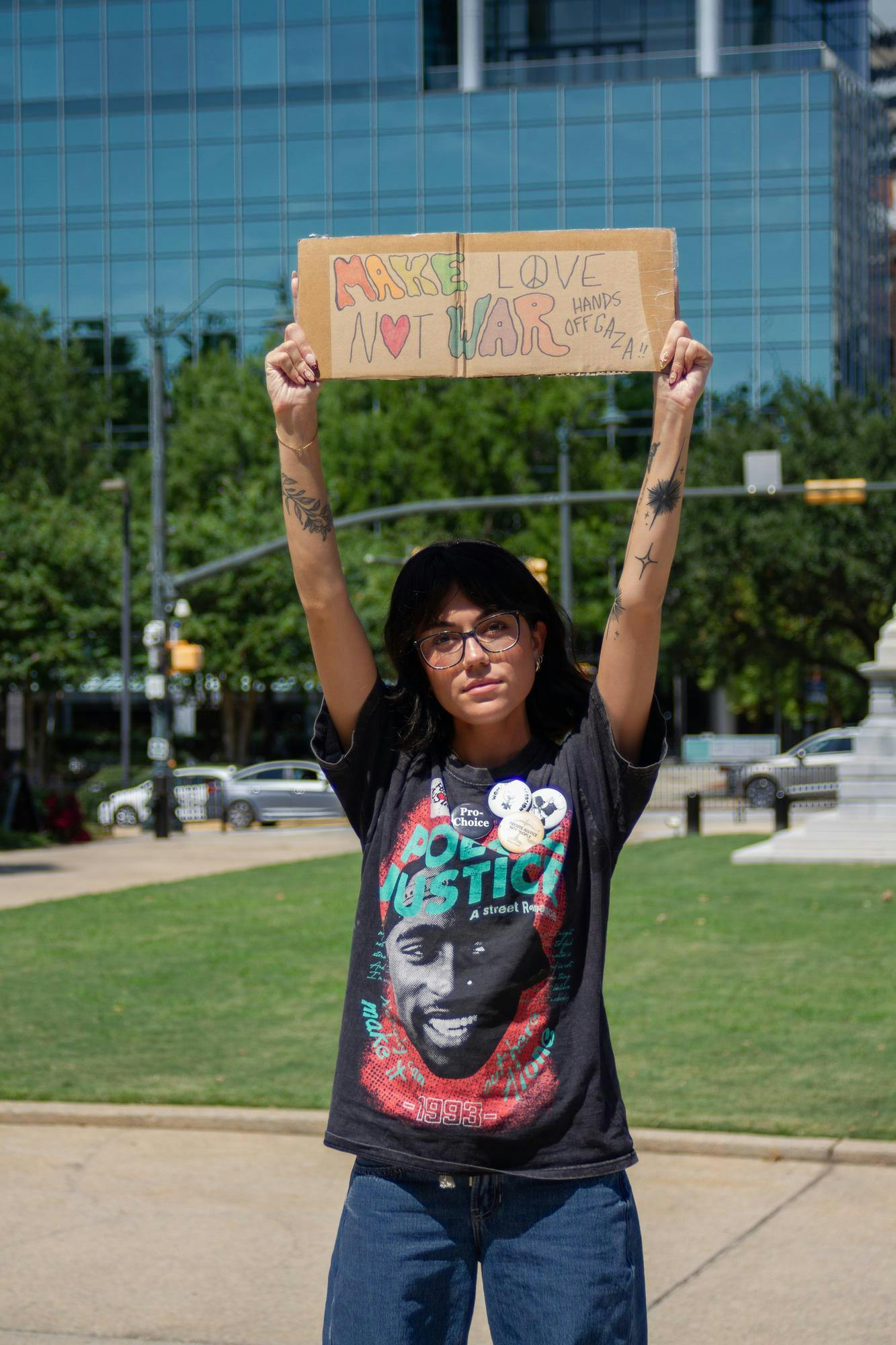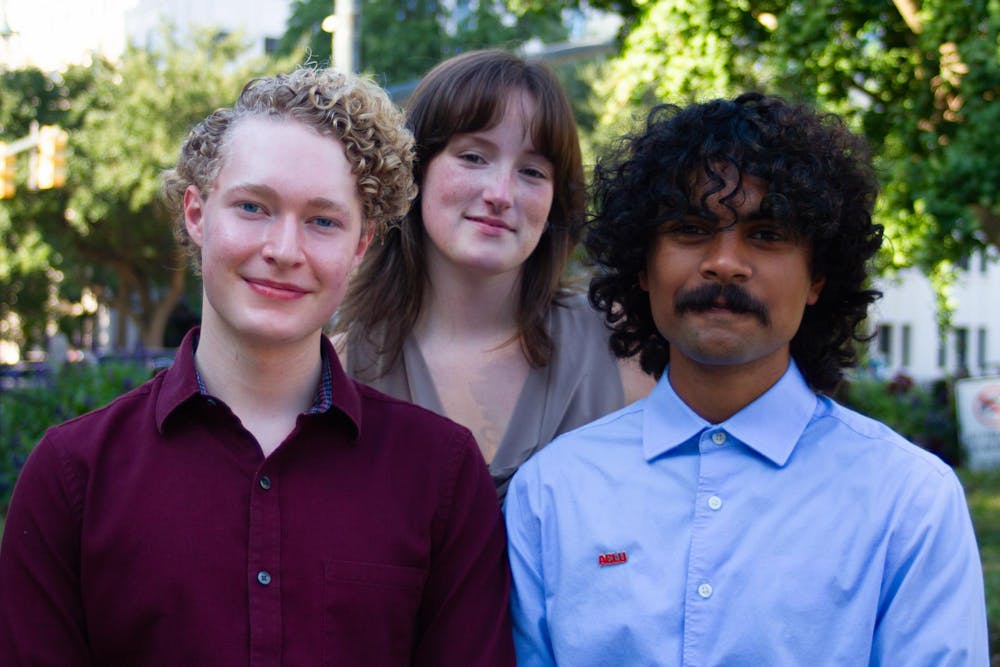Every morning, college students wake up to breaking news — climate disasters, political turmoil and global atrocities. For many, those notifications come just as they’re racing to class or cramming for exams. It raises a question: how do students balance the weight of the world with the pressure of academic success?
At the University of South Carolina, the answer is quite complicated. Students describe living in two different worlds at once: the pressing reality of exams, papers and part-time jobs, and the overwhelming amount of crises unfolding far beyond campus.
Nikki Bui, Associate Director for Mental Health Education and Training with Counseling and Psychology Services, says global events often add to the pile of challenges students already face.
“It seems like every day the political climate changes and we don’t know what we’re getting daily,” Bui explained. Students juggle academics, jobs, housing and food insecurity, while also having to worry about events across the globe. “All those things are what I like to call stressors that can really impact a student’s mental health in a negative way, especially if they don’t have the support and resources in place to navigate through those challenges.”
Bui notes that CAPS has seen an increase in student demand for services compared to last year. She believes much of that demand is tied to the way that global stressors intersect with students’ personal lives.

“People forget that students are still humans who have families,” she said. “Things that affect their family members, their peers, things they’re passionate about—those are impactful, too.”
Social media further complicates the issue. For many students, platforms like Instagram and TikTok have replaced the evening news as their main source of information. The constant stream of updates can help them stay connected, but it also has its own set of drawbacks.
“I feel like social media can be like a blessing and a curse all wrapped up in one," Bui said. "It allows information to spread quickly and helps students stay connected with what’s going on, but at the same time, we don’t always know if it’s factual information. Social media is known for taking stuff and running with it, and spreading misinformation can be detrimental if students aren’t getting the right information. And if they’re on TikTok for four or five hours straight instead of resting or studying, that can negatively impact both their academics and their mental health.”
For some students, the solution is not to step back, but to step forward. Sophomore Kabir Zaman, a dual-degree student in chemical engineering and political science, says activism actually helps him find a healthy balance.
“It’s better than doom-scrolling on Instagram,” Zaman said. “It feels like a productive way to take a break from academics.”
Zaman comes from a family of activists and sees advocacy as an extension of the values he was raised with. He admits global events can sometimes distract from schoolwork but emphasizes that collective action encourages empowerment.
“Doing activism kind of helps defeat a lot of the nihilism that surrounds the world today,” he said. “You go out to a protest and see 500 people there, and you realize it is more meaningful than you might first believe."
Brooklyn Brown, a junior public relations major, echoes that sentiment. She describes herself as an empathetic person and an activist, which sometimes makes the weight of global issues especially hard to carry. But to her, activism often transforms that stress into connection.
“Every time I go out to protest, I feel a lot happier because I’m surrounded by a community of people that really care,” she explained. “Even though the reason we have to protest would normally cause me stress, I try to look at the better side of it as, ‘Wow, look at how many people care, look at how many people are rallying.’”

Still, Brown acknowledges the importance of taking care of yourself. Sometimes, she says, it's necessary to step away from the news cycle.
“I think it’s okay to acknowledge that you might need that so you can show up stronger later,” Brown said. She encouraged students to get involved with existing organizations rather than trying to tackle too much alone and to remember that they can’t show up for others if they’re not taking care of themselves.
Bui shares a similar sentiment, encouraging students to practice daily “body scans”, checking in on their physical, emotional and academic well-being before small stressors pile up into crises.
“Students need to be aware of what’s going on but also find that balance of knowing what you have the capacity to hold, she said. "Set those boundaries because that’s part of self-care.”
Finding support is key, whether through counseling, friends, or campus groups. CAPS offers individual and group therapy, couples counseling and outreach programs on topics like mental health awareness and suicide prevention. Outside of CAPS, students have access to resources like the Gamecock Pantry for food and the Carolina Closet for clothing, in addition to wellness services and dietitians on staff.
For many students, that kind of support makes the difference between being crushed by global events and finding strength despite them. Zaman finds hope in the act of showing up, even when change feels far away.
“[What] I often like to think about is Robert F. Kennedy, who went to apartheid South Africa and delivered a speech against the apartheid government in which he said that every single action is a ripple of hope,” Zaman said. “And that one day, all the little ripples of hope will collide and form a massive tidal wave that will wash over all injustice. When I don’t want to get out of bed and go to a protest at 11 in the morning, I just tell myself, you’re right that this isn’t going to immediately have a change in the community, but it’s a ripple of hope.”
It isn’t easy to study for a chemistry exam or finish a public relations campaign while the world feels unstable, but these students point a way forward. For Brown, the lesson is to transform heavy emotions into something constructive.
“It’s okay to feel sad, but let it flow through you,” Brown said. “Let your sadness turn into action. Even if you can’t solve these big problems by yourself, you can still make an impact—and that feels a lot better than just sitting in your sadness for too long.”



